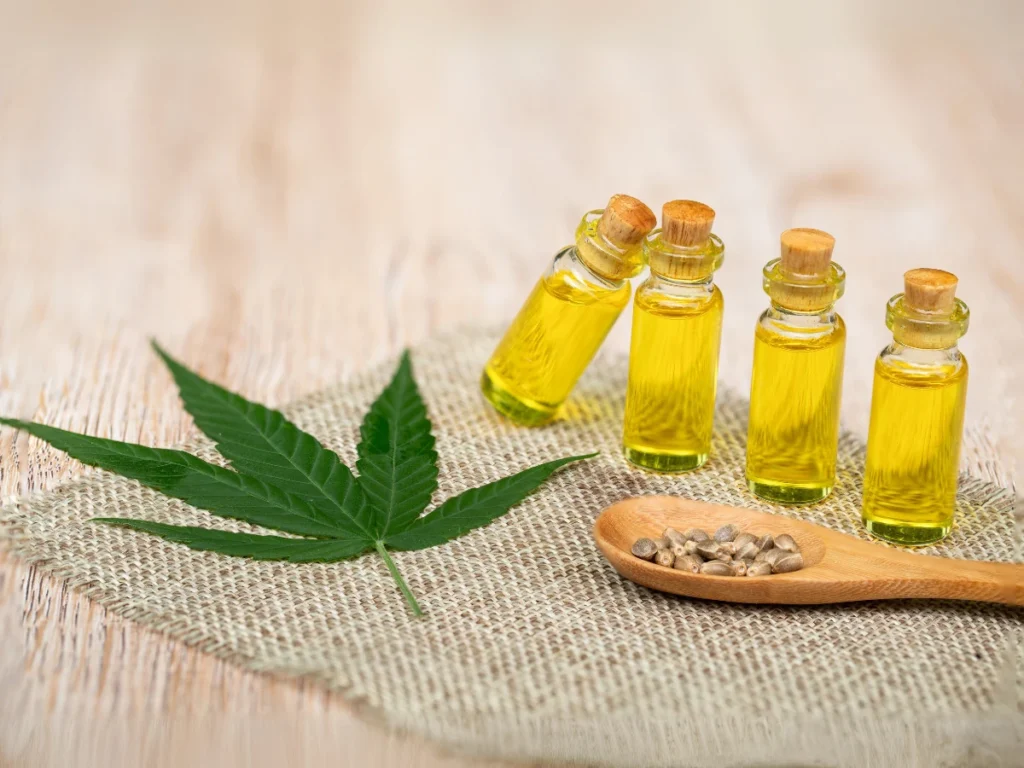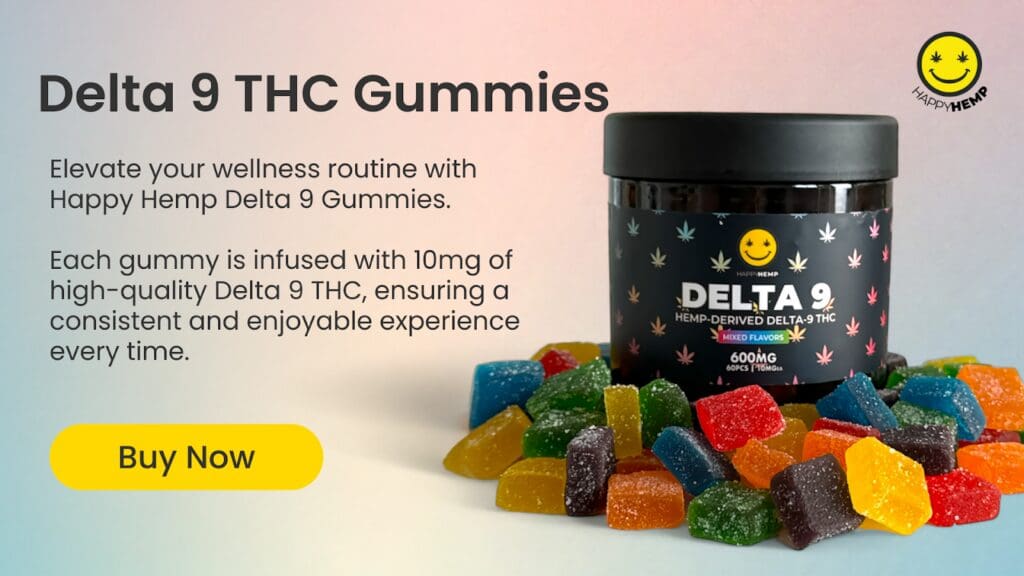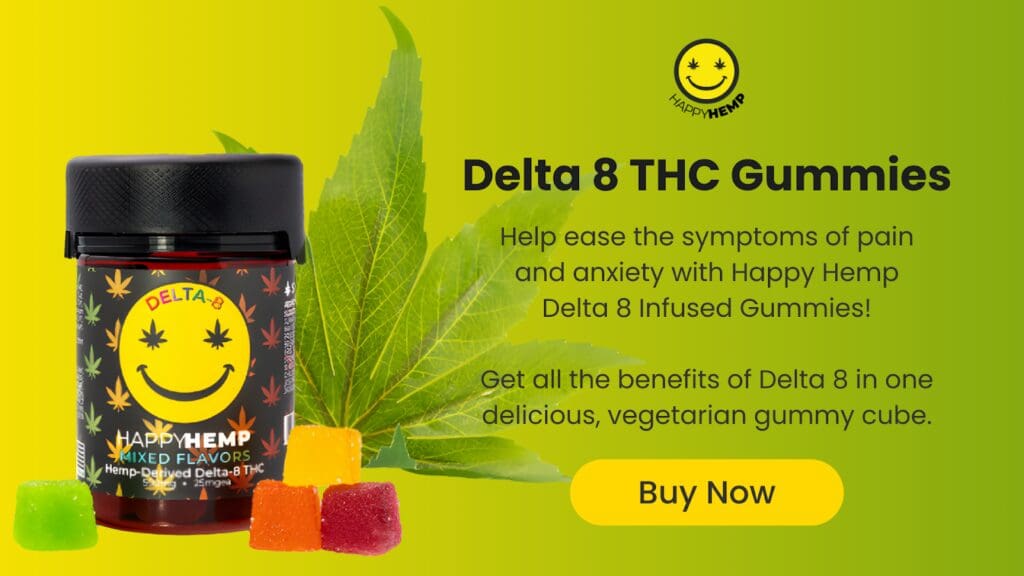Key Takeaways:
- Understanding THCA and THC: THCA is a non-psychoactive compound found in raw cannabis, while THC is its psychoactive counterpart activated by heat.
- Choosing Based on Needs: THCA is ideal for therapeutic effects without the high, whereas THC offers stronger relief with psychoactive experiences.
- Consider Legality and Lifestyle: The choice between THCA and THC depends on your goals, local cannabis laws, and whether you want to stay clear-headed or embrace a classic cannabis high.
If you’ve been exploring hemp or cannabis, you’ve probably come across terms like THCA and THC. At first glance, they might seem like interchangeable terms, but they’re actually quite different. THCA is often described as the “precursor” to THC, but what does that mean? And why does it matter?
At Happy Hemp, we specialize in high-quality THC and THCA products. With years of expertise in crafting premium hemp-based offerings, we’re here to make complex topics simple and help you make informed decisions about your cannabis journey.
In this guide, we’ll break down what each compound is, how they differ, their benefits, potential drawbacks, and even legal considerations.
Understanding THCA
THCA is essentially the raw form of THC. When cannabis or hemp is harvested, the plant primarily contains THCA, not THC. However, when exposed to heat through smoking, vaping, or cooking, THCA goes through a process called decarboxylation, converting it into THC.
Despite its non-psychoactive nature, THCA is thought to have several potential health benefits. Early research suggests it may have anti-inflammatory, neuroprotective, and anti-nausea properties. This makes it an intriguing option for people interested in the therapeutic side of cannabis without the high.
Exploring THC
THC, or tetrahydrocannabinol, is the most well-known cannabinoid in cannabis. It’s the compound responsible for the plant’s psychoactive effects—the “high” that many associate with marijuana use. THC is created when THCA is exposed to heat, converting it into its active form through the process of decarboxylation.
Beyond its recreational appeal, THC offers a range of potential medical benefits. It’s been studied for its ability to alleviate pain, stimulate appetite, reduce nausea, and even aid in managing anxiety or insomnia. However, because THC interacts with the brain’s endocannabinoid receptors, it can also lead to side effects such as dry mouth, red eyes, or feelings of paranoia in some individuals.
How Are THCA And THC Different?
At first glance, THCA and THC might seem almost identical—they share a similar chemical structure and come from the same plant. However, their differences are significant and worth exploring:
Chemical State
THCA exists in raw cannabis as a non-psychoactive compound. It remains inactive until heated, which converts it into THC through a process called decarboxylation. THC, in its active form, is responsible for the psychoactive effects cannabis is famous for.
Effects
THCA won’t produce any kind of high, making it ideal for individuals looking to explore therapeutic benefits without intoxication. THC, on the other hand, interacts with the brain’s endocannabinoid receptors, leading to the euphoria, altered perception, or relaxation often associated with cannabis consumption.
Consumption
THCA is typically consumed in its raw form, such as in tinctures, capsules, or even fresh cannabis juices. THC, however, is consumed after the cannabis is heated, such as through smoking, vaping, or cooking with cannabis.
Benefits Of THCA
Here are some potential benefits of THCA for those seeking wellness without intoxication:
Anti-Inflammatory Properties
THCA is gaining attention for its potential to reduce inflammation in the body. This can be particularly beneficial for those managing chronic inflammatory conditions such as arthritis, Crohn’s disease, or lupus. By addressing inflammation at its root, THCA might improve overall mobility and comfort without the risks associated with traditional anti-inflammatory medications.
Neuroprotective Effects
Early research suggests that THCA could have protective effects on brain cells. This makes it a promising option for slowing down the progression of neurodegenerative conditions like Alzheimer’s, Parkinson’s disease, or multiple sclerosis. For people at risk of such disorders, THCA might support brain health and maintain cognitive function over time.
Nausea Relief
THCA appears to have anti-emetic (anti-nausea) properties, which could be a lifesaver for those struggling with nausea or vomiting. It may be especially useful for patients undergoing treatments like chemotherapy or those with chronic conditions that disrupt digestion. Unlike THC, it achieves these benefits without causing intoxication, making it suitable for daytime use.
Non-Psychoactive
The fact that THCA doesn’t produce a high makes it an appealing choice for individuals who need to stay alert and functional. You can incorporate it into your wellness routine without worrying about feeling intoxicated or impaired. This makes it a particularly attractive option for professionals or anyone sensitive to THC’s psychoactive effects.
Benefits Of THC
Here are some potential benefits of THC if you’re open to its psychoactive effects:
Pain Relief
THC is widely recognized for its powerful pain-relieving properties. It interacts with the body’s endocannabinoid system to reduce pain signals, making it a viable option for those with chronic pain, injuries, or conditions like fibromyalgia. Many patients prefer THC over traditional painkillers as it often has fewer side effects and is less addictive.
Improved Sleep
For those who struggle with insomnia or restlessness, THC can be a natural solution. It promotes relaxation by calming the mind and body, often making it easier to fall asleep and stay asleep through the night. However, finding the right dose is crucial, as too much THC can disrupt sleep cycles or cause grogginess the next day.
Increased Appetite
THC is famous for its ability to boost appetite, making it invaluable for people who struggle with eating disorders or conditions that suppress hunger. For patients undergoing chemotherapy or dealing with illnesses like HIV/AIDS, maintaining a healthy diet can be challenging, and THC offers a natural way to combat this. This effect, known as “the munchies,” can be a welcome benefit for those trying to regain or maintain their weight.
Euphoria And Relaxation
THC provides a mental and physical sense of relaxation that many find enjoyable and therapeutic. It can elevate mood, reduce stress, and even inspire creative thinking, making it appealing for both recreational and medicinal users. For those looking to unwind after a long day or enhance social experiences, THC delivers a versatile and pleasant effect.
Potential Side Effects Of THCA And THC
While THCA and THC each offer plenty of benefits, it’s essential to consider their potential downsides. Knowing these can help you make an informed choice that aligns with your personal needs and preferences.
Potential Side Effects Of THCA
- Limited Research: Although promising, the scientific understanding of THCA is still in its early stages. This means its long-term effects and interactions with other treatments aren’t fully understood.
- Stability Issues: THCA naturally converts into THC when exposed to heat, even mild heat over time. This makes it tricky for some to manage, especially if avoiding psychoactive effects is a priority.
- Mild Digestive Issues: For some users, raw cannabis products containing THCA can occasionally cause digestive discomfort, though this isn’t common.
Potential Side Effects Of THC
- Short-Term Memory Impairment: THC may temporarily affect memory or cognitive function, especially with high doses or frequent use.
- Dry Mouth and Eyes: Commonly known as “cottonmouth,” THC use can cause dehydration in the mouth and dryness in the eyes, which is mostly a minor inconvenience.
- Increased Heart Rate: For some, THC can elevate heart rate, potentially leading to discomfort, especially for individuals with preexisting heart conditions.
- Tolerance and Dependence: Regular use of THC can lead to tolerance, where larger doses are needed to achieve the same effect. In some cases, it may also lead to mild dependence.
Legality Of THCA And THC
The legality of THCA and THC varies widely depending on where you live, and it’s a key factor to consider when deciding between the two. Let’s break it down:
Legality Of THCA
THCA is typically legal in many regions as long as it’s derived from hemp (a cannabis plant containing less than 0.3% THC by dry weight). This is because THCA itself is non-psychoactive and doesn’t fall under the same legal scrutiny as THC. However, there’s a caveat: THCA can legally exist in raw hemp products, but if it’s heated and converted into THC, it may violate local or federal laws.
Consumers should also be mindful of how products are marketed and tested, as some jurisdictions consider the potential for conversion into THC when regulating THCA.
Legality Of THC
THC’s legality depends heavily on local cannabis laws:
- In Legal States or Countries: In areas where cannabis is legal for recreational or medical use, THC is fully permitted under regulated systems.
- In Prohibited Areas: THC is considered a controlled substance in many places, making its possession, use, or distribution illegal.
The laws surrounding THC are rapidly changing, with more countries and states moving toward legalization. Still, it’s crucial to stay informed about your region’s specific regulations.
Which One Is Right For You?
Choosing between THCA and THC ultimately depends on your needs, lifestyle, and what you hope to gain from using cannabinoids. Here’s a simple guide to help you decide:
Choose THCA If
- You Want Non-Psychoactive Relief: THCA is ideal for those looking to manage inflammation, nausea, or other symptoms without feeling high.
- You’re Interested in Wellness Products: Many people use raw cannabis or THCA tinctures as part of their health routines, much like a supplement.
- You Live in a Strictly Regulated Area: THCA’s legal status is often more lenient, making it a safer choice in areas where THC is prohibited.
Choose THC If
- You Want Psychoactive Effects: Whether for recreation or relaxation, THC’s euphoric and calming properties can be enjoyable.
- You Need Stronger Symptom Relief: THC’s effects on pain, sleep, and appetite tend to be more potent, making it a good option for managing severe symptoms.
- You Live in a Legalized Area: If THC is legal where you live, it’s easier to explore different products and find what works best for you.
Final Thoughts
Understanding the differences between THCA and THC is the first step toward choosing the right cannabinoid for your needs. While THCA offers therapeutic benefits without the high, THC provides more potent effects for pain relief, relaxation, and appetite stimulation, albeit with psychoactive experiences.
Your decision should take into account your personal goals, tolerance for psychoactive effects, and the legal regulations in your area. For those who prefer to avoid the high or live in areas with strict THC laws, THCA might be the better option. On the other hand, if you’re seeking stronger symptom relief or enjoy the recreational aspects of cannabis, THC could be the right fit.
As the cannabis industry continues to grow, more products and information are becoming available, empowering users to make choices that suit their lifestyles. Whether you opt for THCA, THC, or a combination of the two, knowledge is your best tool in navigating this exciting field.
Read also:
- THC Edible Dosage Guide: How Much Should You Take?
- How Long Do THC-Infused Drinks Last? Duration And Effects
- Deciphering Delta 8: THC Content and What It Means for You
Frequently Asked Questions About THCA And THC
Does THCA get you high?
No, THCA does not get you high. It is non-psychoactive in its raw form and does not interact with the brain’s receptors in the same way THC does.
Is THCA just as good as THC?
THCA and THC are “good” for different purposes. THCA is valued for its non-psychoactive therapeutic benefits, such as reducing inflammation and nausea, while THC is known for its potent effects on pain relief, appetite stimulation, and its psychoactive properties.
Does smoking turn THCA into THC?
Yes, smoking or exposing THCA to high heat converts it into THC through a process called decarboxylation, making it psychoactive.
What percent THC is THCA?
The THC content from THCA depends on its conversion efficiency. Typically, about 87.7% of the weight of THCA becomes THC after decarboxylation, due to the loss of a carbon dioxide molecule.
How do I activate my THCA?
To activate THCA into THC, expose it to heat through methods like smoking, vaping, baking, or using a decarboxylation device.
Is THCA orally active?
Yes, THCA is orally active in its raw form, but it remains non-psychoactive unless heated. Consuming raw cannabis products allows you to enjoy THCA’s therapeutic effects without intoxication.
What strain has the highest THCA?
Strains like White Widow, Gorilla Glue, and Girl Scout Cookies are known to have high THCA levels, especially in raw form before decarboxylation.
How long does it take for THCA to turn into THC?
Decarboxylation happens almost instantly when THCA is exposed to high heat (like smoking or vaping). For baking or low-heat methods, full conversion can take 30-40 minutes at around 220°F (105°C).
Is THCA detectable in urine?
While THCA itself may not be directly detected, its conversion into THC during use can result in positive tests for THC metabolites in urine drug screenings.
Can you vape THCA?
Yes, you can vape THCA. However, the heat from vaping will convert THCA into THC, making it psychoactive.
Is THCA better than CBD?
It depends on your needs. THCA is better for those seeking potential anti-inflammatory or neuroprotective effects without intoxication, while CBD is favored for broader therapeutic benefits without the risk of converting into a psychoactive compound.
Sources:
- Palomares, B., Ruiz-Pino, F., Martín Garrido-Rodríguez, Prados, M. E., Sánchez-Garrido, M. A., Velasco, I., Vázquez, M. J., Nadal, X., Ferreiro-Vera, C., Morrugares, R., Appendino, G., Calzado, M. A., Tena-Sempere, M., & Muñoz, E. (2020). Tetrahydrocannabinolic acid A (THCA-A) reduces adiposity and prevents metabolic disease caused by diet-induced obesity. Biochemical Pharmacology, 171, 113693–113693. https://doi.org/10.1016/j.bcp.2019.113693
- Iu Raïch, Rivas-Santisteban, R., Lillo, A., Lillo, J., Reyes-Resina, I., Nadal, X., Ferreiro-Vera, C., de, S., Majellaro, M., Sotelo, E., Navarro, G., & Franco, R. (2021). Similarities and differences upon binding of naturally occurring Δ9-tetrahydrocannabinol-derivatives to cannabinoid CB1 and CB2 receptors. Pharmacological Research, 174, 105970–105970. https://doi.org/10.1016/j.phrs.2021.105970
- Park, S.-H., Pauli, C. S., Gostin, E. L., Staples, S. K., Seifried, D., Kinney, C., & Vanden Heuvel, B. D. (2022). Effects of short-term environmental stresses on the onset of cannabinoid production in young immature flowers of industrial hemp (Cannabis sativa L.). Journal of Cannabis Research, 4(1). https://doi.org/10.1186/s42238-021-00111-y









